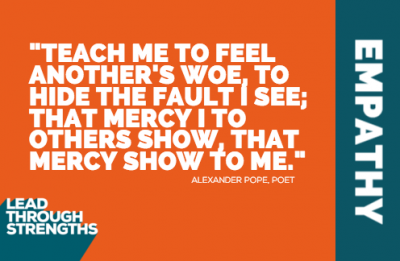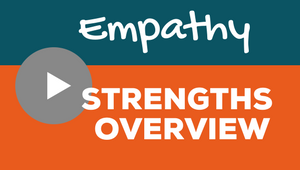How To Apply CliftonStrengths Empathy At Work
StrengthsFinder Definition - Empathy
Often people will ask us, "What does it mean to have the Empathy Strength?" First, know that StrengthsFinder will help you figure out your potential. We call them natural talents or natural patterns. We know you're here because you want to turn them into superpowers in your career, so here's the gist: People exceptionally talented in the Empathy theme can sense other people’s feelings by imagining themselves in others’ lives or situations. Here's the full list of CliftonStrengths definitions so you can check out your other talents as well.
Gallup®, Clifton StrengthsFinder®, StrengthsFinder®, and each of the 34 Clifton StrengthsFinder theme names are trademarks of Gallup, Inc.
CliftonStrengths Empathy - Learn All About It
Your Strengths Will Strengthen Your Performance At Work
In the next section, you'll explore what fuels you up and what drains you. Just like gas (or petrol) in your car, you need to keep your personal tank full to be at your best. Each StrengthsFinder talent theme is energized and drained by different things. When you see the stick figure who looks strong, you can consider how these things fuel you up at work. They're your energy makers. When you see the stick figure who looks weak, consider if these things are draining you at work. They're your energy takers.
 Yucks for CliftonStrengths Empathy
Yucks for CliftonStrengths Empathy
What's a Yuck?
It's a situation, condition, or behavior you might see at work that zaps your energy. Yucks are also things you see on your calendar or to-do list that make you think, "Yuck, if I never had to do that again I'd be thrilled."
Yuck Situations for Empathy
- Blocking or disregarding emotion as legitimate in the workplace
- Dismissing people’s perspectives or reactions
 Yays for CliftonStrengths Empathy
Yays for CliftonStrengths Empathy
What's a Yay?
It's a situation at work that boosts up your energy or makes you feel productive. Yays are also things you see on your calendar or to-do list that make you think, “Yay, fill my days with this."
Yay Situations for Empathy
- Catching an emotion that mattered and using that moment to do something good
- Noticing what others didn’t see, and allowing that to surface
 How CliftonStrengths Empathy Can Be Perceived When Starved
How CliftonStrengths Empathy Can Be Perceived When Starved
What's a Starved Talent?
This section describes how you might be perceived when the shadow side of your talent is showing. It’s when you’re overusing, misapplying, or squashing one of your natural talents rather than turning it into a strength. We often see people starve, squash, or ignore their talent when they assume it is not valued in that role or company culture.
Perceptions of Starved Empathy
- Bleeding heart
- Drama finder
- Drained by negative emotions
 How CliftonStrengths Empathy Can Be Perceived When Fed
How CliftonStrengths Empathy Can Be Perceived When Fed
What's a Fed Talent?
This section describes how you might be perceived when the best version of you shows up at work. It’s when you’ve invested in your natural talents to mature them into strengths. You can feed your talent by considering “how” you approach each “what” on the job. When you apply your talents to productive outcomes, you’re feeding them.
Perceptions of Fed Empathy
- Makes the visceral explicit
- Gives a voice to people
- Spots hidden derailers
 Situations That Make CliftonStrengths Empathy Feel Insulted
Situations That Make CliftonStrengths Empathy Feel Insulted
What's An Insulted Talent?
Usually, talents get offended or insulted by other people who have natural preferences that are different from yours. It also happens if they fail to see their actions have an impact on someone else (you!). You can also insult your own talents if you have a "troublemaker strength" that speaks loudly and overpowers this one.
Things That Will Insult Empathy
- Place a lopsided focus on data and disregard emotions as lacking credibility or truth.
- Telling or dictating rather than asking and expressing.
 Situations That Make CliftonStrengths Empathy Feel Honored
Situations That Make CliftonStrengths Empathy Feel Honored
What's An Honored Talent?
Usually, talents feel honored when other people acknowledge your needs and potential contributions. Talents feel honored when someone “extends an olive branch” to help you work at your best. You can also honor your own talents by investing in them, by choosing work that naturally calls on them, or by applying your strengths to performance on the job.
Things That Will Honor Empathy
- Offer support of their emotional experience so they feel the freedom to laugh or cry or vent.
- Give them time to feel and soak in experiences.
Personal Brand - 'How' CliftonStrengths Empathy Operates At Work
 Most people have a good handle on "What" they bring to the workplace. Resumes, CVs, and career development conversations are filled with lists of skills and job titles that show "what" you can do. Nearly everyone misses the "How".
Most people have a good handle on "What" they bring to the workplace. Resumes, CVs, and career development conversations are filled with lists of skills and job titles that show "what" you can do. Nearly everyone misses the "How".
Your Clifton StrengthsFinder talent themes help you communicate "How" you show up. It's how you think. It's how you feel. It's how you act. These are huge differences in each person that are differentiators on the job. Consider these adjectives you might want to consciously put into your personal branding efforts.
We recommend working a "How" description into the Summary section in your LinkedIn profile (if you don't yet use that section, don't worry, most people haven't paid attention to it until now). Of course, make up adjectives or phrases that describe you at your best. Try to avoid words like "motivated, self-starter" because they're so overused that you'll blend in with everyone else. Here are some ideas to spark your thinking:
- Emotional Intelligence
- In-Tune
- Perceptive
- Feeler
- Caring
- Sage
- Listener
- Sympathetic
- Absorber
- Confidant
- Friendly
- Intuitive
How To Invest In Your CliftonStrengths Empathy Talent On The Job
- Appreciate your gift for getting in touch with the thoughts and feelings of others.
- Practice naming the feelings you experience and those you observe in others, then help others name their feelings. People who can name their feelings seem to work better with other people.
- Build trust with others by letting them know that you know how they are feeling.
- Help your colleagues be aware of the feelings of the persons with whom they work.
- Identify a friend who has strong Empathy and check your observations with him or her.
- Sometimes it is important to be silent. You have the talent to, without talking, let other people understand that you know how they are feeling. Over time, refine your non-verbal communication skills.
- Act quickly and firmly if a person is behaving in a way that is unhealthy for that person or for those around him or her. Understanding someone’s emotional state does not mean that you must excuse this behavior. Be aware that when your empathy turns to sympathy, others might see you as a “bleeding heart.”
- Partner with someone with a strong Command or Activator theme. This person will help you to take needed action, even though people’s feelings might suffer as a result.
Tips For Managing Someone Who Leads Through The CliftonStrengths Empathy Talent
- Ask this person to help you know how certain people within your organization are feeling. They are sensitive to the emotions of others.
- Before securing their commitment to a particular course of action, ask them how they feel and how other people feel about the issues involved. For them, emotions are as real as other, more practical factors and must be weighed when making decisions.
- Pay attention but do not overreact when they cry. Tears are part of their life. They may sense the joy or tragedy in another person’s life more poignantly than even that person does.
- Help this person to see his or her Empathy as a special gift. It may come so naturally to them that they now think everyone feels what they feel, or they may be embarrassed by their strength of feeling. Show them how to use it to everyone’s advantage.
- Test this person’s ability to make decisions instinctively rather than logically. They may not be able to articulate why they think that a certain action is right, but they will often be right nonetheless. Ask them, “What is your gut feeling about what we should do?”
- Arrange for them to work with positive, optimistic people. They will pick up on these feelings and be motivated. Conversely, steer them away from pessimists and cynics. They will depress them.
- When employees or customers have difficulty understanding why an action is necessary, ask them for help. They may be able to sense what they are missing.
What To Consider When Partnering With A Colleague Who Leads Through CliftonStrengths Empathy
- Ask this person to partner with you when colleagues or customers simply can’t understand each other. This person has a sixth sense that can get to human understanding.
- When you need a team to support each other, ask your colleague with high Empathy what happened in the room that you might have missed. They’re great at spotting situations when someone is nodding along in agreement, yet they don’t actually plan to follow along with the agreements in the room. Your teammate with Empathy often knows these derailers are coming.
- Call on them when you need deep listening. They can help teams become clear and less conflicted. They listen keenly, and it’s more than with just their ears.
Turn CliftonStrengths Empathy Into A Strength This Month By Making It Your Phone Lock Screen
 Click on this thumbnail image of your StrengthsFinder talent theme to link to the full size image. Then save it to your phone or mobile device as your lock screen.
Click on this thumbnail image of your StrengthsFinder talent theme to link to the full size image. Then save it to your phone or mobile device as your lock screen.
That way, you’ll be reminded of your plan to focus on that talent…oh…about 98 times per day when you unlock your phone. What a great way to keep your intention front-of-mind! This will help you remember to invest in this talent theme so you can take the untapped potential and turn the natural talent into a strength.
Who knew wallpaper images could be so valuable to your career?! Here are all of the lock screen images if you want to grab an image for a different CliftonStrengths talent.



